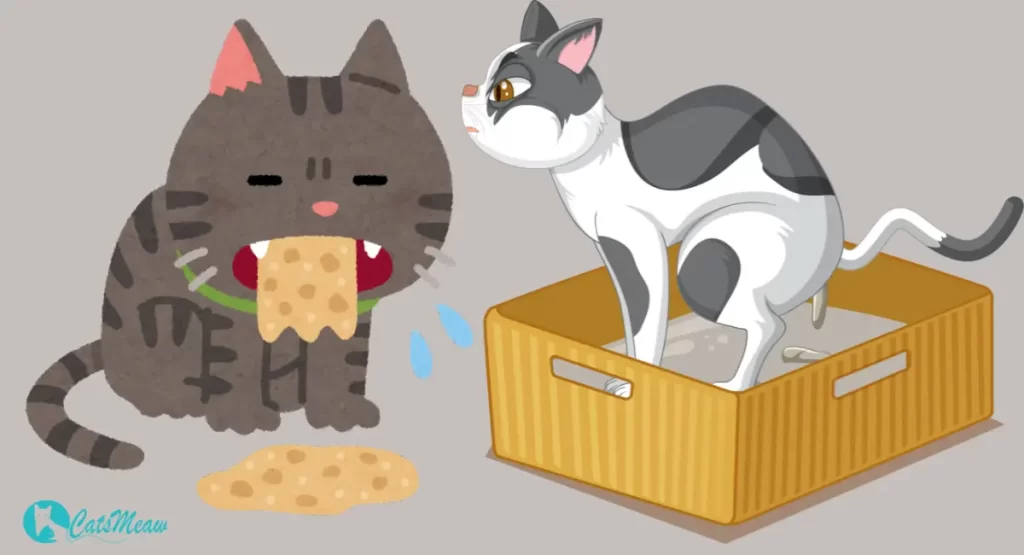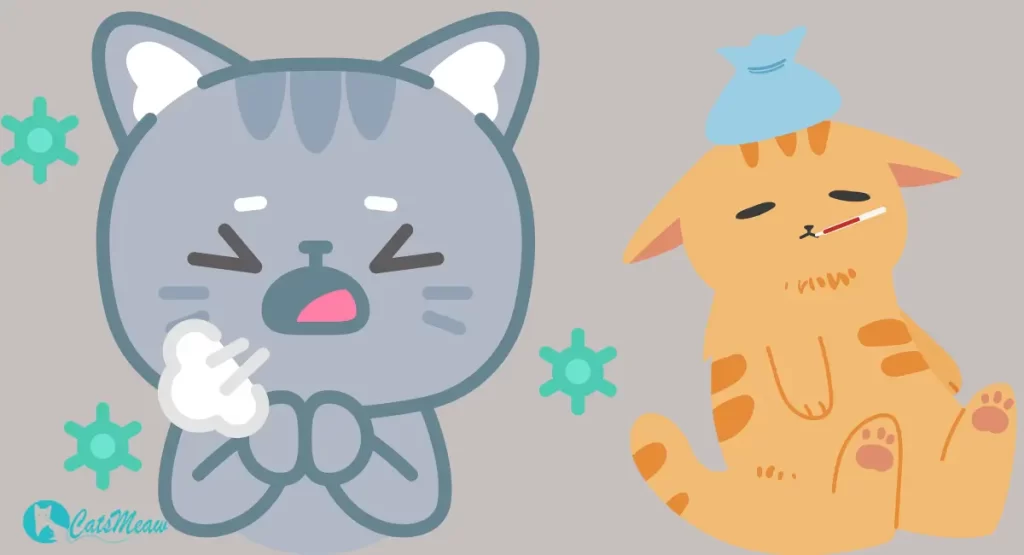As a cat owner, seeing your pet vomit or have diarrhea can be upsetting. It’s important to know why this happens to help your cat feel better. Many things can cause vomiting and diarrhea in cats, like bad food, infections, or health problems. Spotting these signs early helps find the right treatment.

Table of Contents
It’s key to know that vomiting and diarrhea in cats might mean a bigger health issue. If your cat keeps vomiting or has diarrhea, get them to the vet fast. Knowing what causes these symptoms helps you get your cat the best care.
Key Takeaways
- Recognize the signs and symptoms of cat vomiting and diarrhea to determine the best course of treatment.
- Understand dietary issues, infections, and underlying health conditions that can cause cat vomiting and diarrhea.
- Seek veterinary care if your cat is experiencing persistent or severe vomiting and diarrhea.
- Be aware of the possible dangers and complications from cat vomiting and diarrhea.
- Give your cat a balanced diet and a healthy lifestyle to lower digestive problems.
- Monitor your cat’s health and get vet help if their behaviour or condition changes.
Understanding Cat Vomiting and Diarrhea Symptoms
As a cat owner, knowing when your pet is not feeling well is key. Cats can have diarrhea and vomiting, but knowing when it’s not normal is important. If your cat is vomiting and having diarrhea often, it might be a sign of a bigger problem.
It’s important to catch signs of digestive issues early. Watch for changes in your cat’s appetite, energy, or belly pain. If your cat is vomiting and having diarrhea, it’s time to see the vet.
Common Signs of Digestive Distress
- Frequent vomiting or diarrhea
- Loss of appetite or weight loss
- Abdominal pain or discomfort
- Changes in stool quality or colour
Normal vs. Abnormal Symptoms
It’s okay if your cat vomits or has diarrhea sometimes. But if it keeps happening or comes with blood, it’s serious. You should talk to your vet to find out what’s wrong.
Duration and Frequency Concerns
How long and how often your cat vomits or has diarrhea matters. Long-term issues can lead to dehydration and other problems. If your cat is vomiting or having diarrhea a lot, get vet help fast.
| Duration | Frequency | Concern Level |
|---|---|---|
| Less than 24 hours | Occasional | Low |
| 24-48 hours | Frequent | Moderate |
| More than 48 hours | Persistent | High |
Common Causes of Digestive Issues in Cats
As a cat owner, you know that cat is vomiting and having diarrhea can stem from many sources. It’s key to understand these causes to care for your cat well. Cats often get sick from eating things they shouldn’t, like spoiled food or toxic plants.

Other reasons for cat vomiting and diarrhea include food allergies and infections. Cats can get sick from food allergies or infections. Chronic diseases, like inflammatory bowel disease, also play a role.
Some common causes of digestive issues in cats include:
- Dietary indiscretion
- Food allergies
- Infections (bacterial, viral, or parasitic)
- Chronic diseases (inflammatory bowel disease, kidney disease, etc.)
Read More: Why is My Cat throwing up white foam?
Knowing these causes helps you prevent and prepare for your cat’s health. Regular vet visits and a balanced diet can help. If your cat has digestive problems, see a vet to find the cause and get treatment.
| Cause | Description |
|---|---|
| Dietary Indiscretion | Eating spoiled food, toxic substances, or plants |
| Food Allergies | Allergic reactions to certain ingredients in food |
| Infections | Bacterial, viral, or parasitic infections |
| Chronic Diseases | Inflammatory bowel disease, kidney disease, etc. |
When to Seek Immediate Veterinary Care
Knowing when your cat needs a vet is key as a cat owner. cat vomiting and diarrhea can turn serious fast, leading to dehydration. Look out for these signs to act quickly.
Your cat’s health is up to you. Quick action is vital, as dehydration can be deadly in kittens or older cats. Watch for excessive thirst, dark urine, or sunken eyes. These signs point to dehydration.
Emergency Warning Signs
- Bloody stools or vomit
- Severe abdominal pain
- Refusal to eat or drink
- Difficulty breathing
If your cat shows any of these signs, get them to a vet fast. cat vomiting and diarrhea can stem from many causes. A vet can diagnose and treat it properly. This way, you can avoid serious issues and help your cat improve.
Treatment Options and Home Care Methods
Giving your cat the right care is key when it has diarrhea and vomiting. A mix of vet treatment and home care can help manage their symptoms. Your vet will choose the best treatment, including medicine, diet changes, and other steps.
Working closely with your vet to tackle your cat’s digestive problems is important. They will find the best treatment for your cat, which could include:
- Veterinary therapies, such as medication to control vomiting and diarrhea
- Dietary management, including temporary changes to your cat’s food to help manage their condition
- Safe home remedies, like providing a comfortable and stress-free environment to help your cat recover
Veterinary Treatments Available
Vet treatments for cat vomiting and diarrhea depending on the cause. Your vet might give medicine to manage symptoms. They will also guide you on diet and other care.
Safe Home Remedies
There are safe home remedies to help your cat feel better. Try giving them a warm, quiet spot to rest. Also, small amounts of bland food should be offered to ease their digestive issues.
Dietary Management Tips
Diet is key in helping your cat recover from vomiting and diarrhea. Your vet can suggest the best food and how to introduce new foods slowly. You can help your cat get better and prevent future problems with the right care.
Preventing Future Episodes of Digestive Issues
Understanding the causes and symptoms of cat vomiting and diarrhea is key. You can prevent future digestive problems by taking action. A balanced diet, clean water, and regular vet visits are all important.
Read More: The Best Food For Cats With Sensitive Stomachs
Cats can face many gastrointestinal issues. But, with care and attention, you can keep your cat healthy. Watch for any changes in your cat’s behaviour or bowel habits. If you’re worried, always talk to your vet.
By focusing on your cat’s digestive health, you can avoid future vomiting and diarrhea. This keeps your cat happy and healthy. Your cat can live a long, healthy life with the right care.
FAQ
1- What are the common causes of vomiting and diarrhea in cats?
Cats can get vomiting and diarrhea from many things. This includes food allergies, infections, and health problems. Common causes include food allergies, infections, and diseases like inflammatory bowel disease and chronic kidney disease.
2- How can I tell if my cat’s vomiting and diarrhea are normal or require veterinary attention?
Sometimes, cats vomit or have diarrhea, and it’s okay. But you should see a vet if it happens often or they seem tired. Look out for signs like a lot of dehydration, blood in their vomit or stool, and if they won’t eat or drink.
3- What are the treatment options for vomiting and diarrhea in cats?
The treatment depends on why your cat is sick. The vet might give medicine, change their diet, or even hospitalize them. At home, give them bland food and lots of water. Please don’t give them human medicine without first checking with your vet.
4- How can I prevent future episodes of vomiting and diarrhea in my cat?
To stop future problems, keep their diet steady, clean their area, and visit the vet regularly. Don’t change their food suddenly; feed them good, age-right food. Make sure they always have clean water. If their bowel movements or health changes, see your vet right away.
5- When should I take my cat to the vet for vomiting and diarrhea?
Take your cat to the vet if it vomits, has diarrhea a lot, seems tired, or won’t eat or drink. Signs like a lot of dehydration, blood in their vomit or stool, and not eating or drinking are emergencies.
